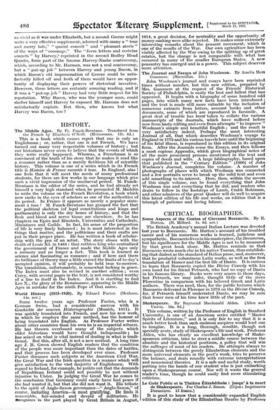HISTORY.
The Middle Ages. By Fr. Funck-Brentano. Translated from the French by Elizabeth O'Neill. (Heinemann. 12s. 6d.) This is a book which causes regret that one is only an Englishman ; or, rather, that one is not French. We have turned out many very respectable volumes of history ; but our historians never seem to believe that the events of which they write really happened. Whereas, a Frenchman is so convinced of the truth of his story that he makes it read like a romance rather than as a merely fictitious bit of scientific history. This volume is one of a series which in its French title is Histoire de France racontie h tour. In England, alas ! one feels that it will meet the needs of many professional students, for there are few works in our language which give such a vivid impression of the mediaeval period. M. Funck- Brentano is the editor of the series, and he had already set himself a very high standard when he persuaded M. Madelin to write the volume on the French Revolution, a book which now ranks in the eyes of scholars as one of the authorities of its period. In France it appears as merely a popular state- ment 4 tour ! M. Funck-Brentano has grasped the fact that the political skeleton (of legal constitutions and kings and parliaments) is only the dry bones of history, and that the flesh and blood and nerve tissue are elsewhere. So he has chapters on Epics and Minstrels, Universities and Cathedrals, Miniatures and Guilds. In fact, his sense of the proportion of life is very finely balanced ; he is most interested in the things that matter, and the politicians and their crafts are put m their proper place. He has written a book of scholar- ship with the pen of an artist. The story closes with the death of Louis XI. in 1483: that ruthless king who centralized the government of France and made the Middle Ages only a memory and no longer a fact. This book is learned as science and fascinating as romance ; and if here and there its brilliance of theory may a little exceed the limits of to-day's accepted opinion, it will probably be held true to-morrow. The translation, unfortunately, is somewhat lacking in grace. The Index must also be revised in another edition ; even Crecy, with several pages in the text, is not considered worthy of a line to itself in the Index. And it is startling to find Leo X., the glory of the Renaissance, appearing in the Middle Ages in mistake for the ninth Pope of that name.


































































 Previous page
Previous page